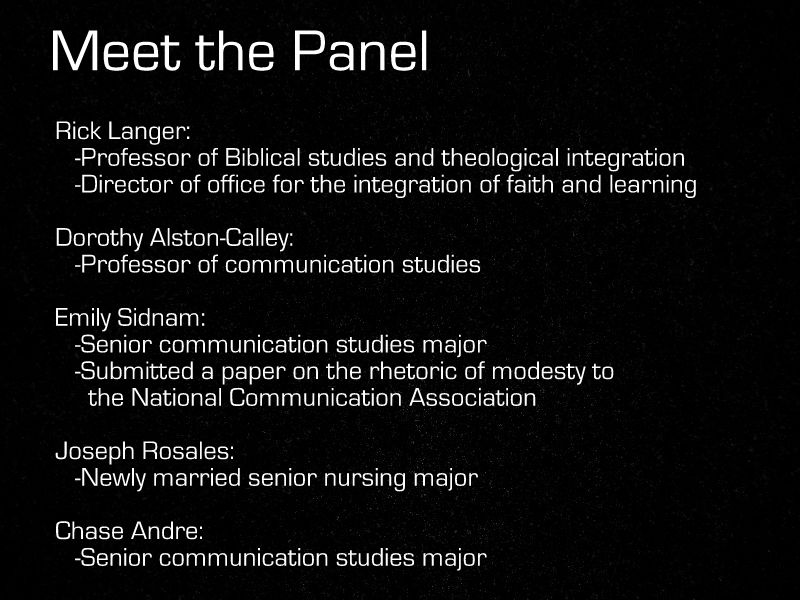Written by Cassandra Gonzales
Introduction:
When the word “chastity” is mentioned, some people might wrinkle their noses or scratch their heads in confusion. It is a word that is either revered and readily understood or repressed and approached with indifference.
In Mere Christianity, C.S. Lewis defines chastity amongst the Christian community as, “the most unpopular of all the Christian virtues.” While some might argue that this notion is still true in the Christian community, perhaps this statement most aptly applies to the college age generation. Many forget that chastity is, indeed, a Christian virtue and a spiritual discipline that is to be practiced within the community.
Theological giants such as St. Augustine and Dietrich Bonheoffer defined this term as a spiritual virtue. Augustine remarked, “Chastity is a virtue of the mind.” Bonheoffer also defined chastity as a discipline by stating, “The essence of chastity is the total orientation of one’s life toward a goal.” Dallas Willard emphasizes chastity as a spiritual discipline of letting go and coupling to something that builds the body up. While these theologians have provided a biblical survey of the issue, how is it practically lived out? And can it be lived out on a Christian campus like Biola?
In trying to analyze the rhetoric of the word, “chastity,” The Point assembled a panel of students and faculty to discuss the topic of chastity as it is represented on Biola’s campus and to provide a more robust view of what chastity looks like. This is the starting point in trying to discover what chastity looks like lived out, beginning with analyzing the rhetoric used on Biola’s campus.
The Conversation:
Point: Thank you for coming this morning to discuss this topic. The purpose of this panel is to discuss the rhetorical messages on Biola’s campus regarding chastity. So, lets start off with the first question to get the ball rolling. Students are required to sign a contract that states they will abstain from sexual conduct. What rhetoric exists on Biola’s campus in regards to the topic of chastity or sexual purity?
Langer: Analyzing rhetoric is not one of my daily activities; I’m the more philosopher type. However, the question you are asking is paradoxical. You quote a catalog contract requirement and then you ask about chastity. I think that is a fair way of how we view that game. Abstinence points toward the violation, the boundary, not toward playing the game, so to speak. It doesn’t make you think of what sex is, and what it is there for. It does not make you think of it in a positive term. It is more like, here is the boundary and don’t violate it.
Calley: Looking at this topic in the context of rhetoric, you know, it says “conduct” but what does the word conduct mean? What is sexual conduct and what does it mean? Is it all that other stuff or does it just mean intercourse? I think those things need definitions because you are asking them to abstain from sexual conduct.
Andre: The contract, in a sense, is viewed as kind of a joke. Viewing pornography is stated to be a violation of contract, but not many really view it as a violation of sexual misconduct.
Rosales: To be quite honest, I’m not sure I’ve heard any “rhetoric” on this subject due to the fact that it seems taboo to talk about on campus. Now, not the thought of abstaining from the physical nature of sex, but more of the deeper subject of being chaste. Chastity is a lost word, one that does not appear in Biola’s community standards. And even if it did appear, I rather doubt anyone would notice due to the lack of actually reading the contract. I feel we are completely lacking in any direction as to what chastity looks like and how it helps develops spiritual integrity. There are the comical phrases such as “leave room for the Holy Spirit” that float around campus, and there is enforcement of the open house rules by our Res Life staff members, but I feel that is the most I have seen this subject being dealt with.
Point: So what would educating Biola students on chastity look like?
Sidnam: Two important things need to go into the education on chastity: one, we need delineation between what chastity looks like and how is it lived out. You know, what are we not supposed to be doing needs to be defined. But we also need the value system. What is the value we are aiming for? What is chastity? We don’t [thoroughly] define the things that we are to be aiming for — we don’t often think of chastity as a virtue, we think of it as this weird word that has all these negative connotations attached to it — almost prudish in a way.
Rosales: While chastity does end with the physical, it is to my understanding that chastity begins with spiritual discipline. There are so many subjects we do not talk about such as masturbation, pornography, sexual addiction, same-sex attraction, rape, gender confusion and molestation. Meanwhile, all the secular campuses around us have conferences and support groups regarding these very subjects. We, as a Christian university, seem to forget to include such conferences. We ignore the issues that our graduates are going to encounter with more frequency, and that frightens me. We need to get up to speed and examine our sex-hungry culture with a spiritual mind, if only to have a better answer when the world asks why we choose to refrain from splurging in the sexual marketplace. So, how do we do this? A conference would be a start, followed by support groups, fireside chats and a deeper examination of the reason why we are trying so desperately to give away that which is sacred.
Sidnam: We need to have an understanding of what Christianity has to offer—that we have a confidence and a hope and that we should want to be abstinent and be chaste because it is something good and beneficial for us—it was what we were designed for. And it is not just for the promise that we will get married one day because what if we don’t get married one day? That is something we definitely do not focus on. But you know, what if you don’t get married? Then people ask, why should I be chaste? What is the benefit? Why did God design our bodies the way he did? Why did he make man and woman? What is the purpose of sex and what does that teach us about God? What does fidelity teach us about God? We need to really understand the whole picture, and I think defining and answering all of those questions will help us. We need to focus on the big picture but also the little steps to get to the big picture. They are both necessary, and I really feel that that emphasis is missing on the rhetoric of chastity.
Calley: One of the things that my friend did with a non-profit abstinence program was teach kids about healthy decision-making, and I think it would work with college students. It gives them a personal choice in that it allows them to think through the personal ramifications that could happen when you have sex outside of marriage. I think that would be palatable to a college student. It isn’t condescending and it sees them as a whole person. It speaks to their intellect and soul and ties it all together in asking what the ramifications are. What are the ramifications to your soul? What are the ramifications to you physically? I like the idea of healthy decision-making in terms to better educate [individuals].
Andre: I don’t know if this is pointing out the obvious, but I think there is a connection with prayer and remaining chaste. I mean, statistically, the reality is that there will be a large percentage of us graduates who will fall away from the faith, but what I am concerned about is whether have we divorced God out of our cultural reality. Have we kept God out of sex and out of marriage — so much so that it doesn’t feel right to pray about our relationships and our sexuality and life plans? If that is the case, and we are not bringing God into our relationships, then how do we expect people to stay chaste?
Point: Do you believe, then, that the spiritual discipline of chastity is represented on Biola’s campus? We are all biblical studies minors. Do you think chastity is represented in a way that we all acknowledge it as a spiritual discipline?
Sidnam: As a Biola student, I do not see as much of a focus on chastity as I do on abstinence. The only thing that I really remember that focuses on the rhetoric of abstinence is [Define the Relationship] week, but it assumes a relationship already and does not focus on singleness. Or the signs in the dorm rooms that tell you what is a proper display of PDA. I’m sure they have done chapels on [sexual purity] but there has not been extended advertisement given to students about the chapels. There was a time that I did go to a chapel that featured a panel of RD’s and RC’s. They talked about their struggles and orientation toward dating. That chapel was good and encouraging because you were able to experience others narratives and see teachings lived out in a practical way.
Andre: I was not there for that chapel, but if you take that out everything else you mentioned was about abstinence, and the question was chastity. I would say the same about my experiences. So, unfortunately my answer is no. I have been around this campus for a while and I cannot think of a time where chastity language has been mentioned.
Langer: But what would be chastity language? You throw out the word chaste, and like you said, the underlying word is abstinence. So, what distinguishes it from abstinence language?
Point: You’re taking my next question! panel laughs
Andre: I’ll take a stab at it. I think chastity language is the “why’s.” It answers why we don’t do this and that. The “how’s” and “what’s” is abstinence language. But the “why you don’t do this” and the “why you wait” is chastity language. You aren’t dealing with only the physicality but you’re dealing with the heart. It is a very subtle difference and a thin line but the difference is there.
Sidnam: And using the rhetoric of abstinence gives us the idea of a repression of sexuality and chastity is more about glorifying God with your sexuality and recognizing what you were designed for. [Chastity] is good and it is God-ordained, but also recognizing that it has a place and a purpose is what chastity is. It shows how we are glorifying God with our body.
Calley: I think its hard to define because there are so many connotations with chastity. The first thing I think of, honestly, is a chastity belt. There are so many inherent gender problems with the term — I’m sure you are all surprised I am saying that — but there are! Because when you think of a chastity belt, you see it as a very female issue and the language is very feminine.
Langer goes to the whiteboard, picks up a marker and starts writing.
Langer: We need to think positive of chastity and big picture stuff. Writes “body” on the board. First, we are embodied souls; we are a body, a gender body. Writes “male” and “female” on the board. I am telling a biblical story here now. See, now you get marriage — husband and wife — and then this crazy thing happens and you get sex. Then this miraculous thing happens and you get children. You can think of this biblically and think of this linear thing as a set of railroad tracks that bind this all together, and in order to get one thing you must start at the beginning with examining the body.
Point: So, how would you all define chastity for Biola’s campus and how would you encourage students to pursue it?
Rosales: I see it as it pertains to a deep knowledge of ourselves as deprived beings who are calling out to be loved and enjoyed. Chastity corrects the sexuality of a person and brings it back to where it needs to be. It should be used to tame the broken soul with spiritual discipline and to realign our hearts to God. Is chastity an outdated term? No, it is a term that is desperately in need of revision.
Langer: I probably would not use the word chastity — now you have me thinking chastity belt! It is one of those words that would be great but there are a lot of “ifs” and it is one of those words that will be pretty hard to row your boat up. I would suggest as an alternative to use the word “devotion.” Because it moves you close to the goal — I mean, what is it that you want students to do with their sexual bodies? You want them to devote their bodies to Jesus. You want them to be the devoted embodied. Devotion is thought of as only a personal Bible study, but not something we do with our body or our work, because we don’t think of it in that theological way. Not because it can’t be a theological thing, but because we do not think of it that way. So, I would like to beat the drum for making it be called devotion. I think that would be the best approach.
Calley: A good way to encourage students would be to talk about sex in a community matter rather than a private matter. You said you read Lauren Winner’s book, Real Sex, and in it she advocates that sex be a communal topic, and I think that is significant. This is going to sound bad, but we need to take sex out of the bedroom — there is something to that idea of community. I would also like to see us having discussions together. Biola has separate chapels for males and females [when speaking about sexuality] but why can’t we have these discussions together and share our hearts and struggles with one another?
Langer: It is interesting how much we see sex [in our culture] but how private we make it. It doesn’t lead to healthy communal expression of the issues.
Sidnam: Our rhetoric has been convoluted and that makes it difficult to define chastity. We draw things from culture and tradition. The idea of adding in a new rhetoric of chastity could be helpful to our community, because if we did a seminar and marketed it about chastity people will not be more likely to come, but if we have a seminar on devotion it may draw in more people. I also think it would be good to add more to the contract to help delineate blurred lines for people.
Andre: I like the idea of changing it into a new rhetoric, but maybe marrying it with the old rhetoric too. I think that“chaste devotion,” introduces the richness of the word that we lost. Also, if we are to couch this topic on campus I would say to keep it as far away form the contract as possible. Lets do it in a community and talk about the positives and not just the negatives.
Rosales: I would encourage students to strive for holiness. Seek God and admonish one another. Become an active member in a community of believers. Regard others higher than yourself and most of all remember that your body is a temple and your mind is what controls that temple.





